UN Assistance to COVID-19 Response in Papua New Guinea: February through July 2020
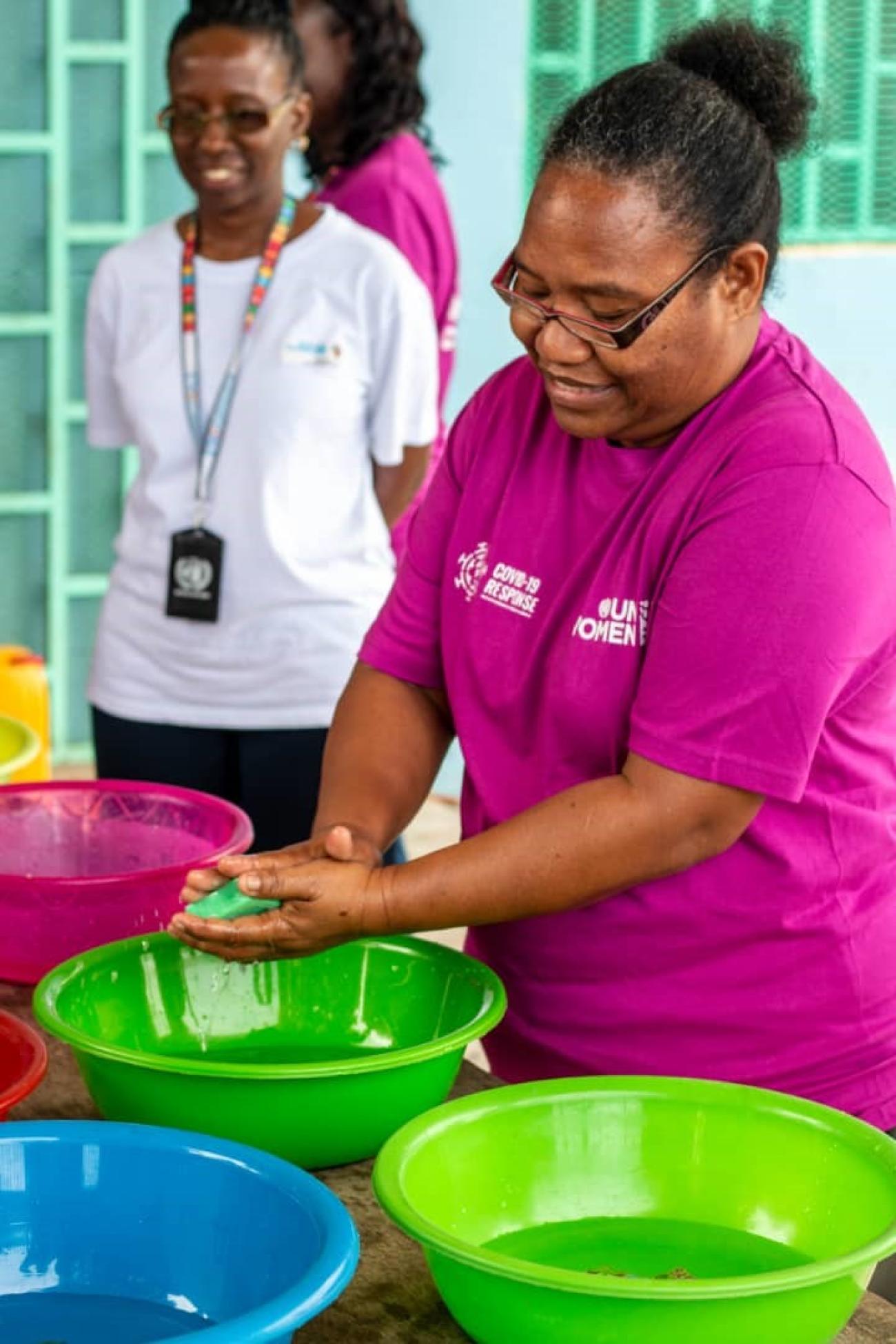
13 agencies are providing humanitarian coordination, technical support, and essential medical equipment to bolster national and provincial response.
The organizations of the United Nations in Papua New Guinea have been supporting national efforts to prepare and respond to a COVID-19 outbreak in Papua New Guinea, including through technical and capacity building support to the National Department of Health and other government bodies, the delivery of essential health supplies to bolster national and provincial response capacities, and continued assessment of the needs of local communities to inform this response.
COVID Situation in Papua New Guinea
The first case was reported on 20 March. A man who had travelled from Europe, through Singapore and Port Moresby, tested positive in Lae before being repatriated to Australia. The second case is a 40 year old female from the East New Britain Province who developed cough on 23 March and was admitted to the Nonga Hospital isolation ward on March 28 where she was treated for severe respiratory illness. This illness was confirmed as COVID-19 on 6 April and the woman has since tested negative.
On April 16, a further five persons were confirmed to have COVID-19, including a man from East New Britain, three persons from Western Province who had returned from across the border in Indonesia, and one woman in Port Moresby, National Capital District. An eighth case was confirmed on April 22, when a woman who was being treated for respiratory distress in Asaro Health Centre, Eastern Highlands, returned a positive test result. On June 20, a ninth case was confirmed in Port Moresby as a foreign resident who had been in country since January and contact tracing lead to the announcement of an additional two cases. By July 20, 7 new cases linked to a testing laboratory at Port Moresby General Hospital were announced. An increase in cases followed announcement of this cluster.
Following the announcement of the first case, the government announced a ban on foreigners entering Papua New Guinea and on 23 March the Governor-General Grand Chief Sir Bob Dadae declared a 14-day State of Emergency to allow for contact tracing. Commissioner of Police, David Manning, was appointed Controller of the State of Emergency and a National Emergency Operations Centre was established. On 3 April, the State of Emergency was extended for 2 months. On June 16, the National Pandemic Act 2020 came into effect.
A Coordinated Response
The UN COVID-19 response has been made possible through the contribution of FAO, IOM, OHCHR, UN Women, UNAIDS, UNDP, UNDSS, UNICEF, UNFPA, UNHCR, UNOPS, UN Volunteers, WFP, WHO and the Resident Coordinator's Office (UNRCO).
To support the Government’s preparedness and response plan, UN agencies have secured funding from Australia, India, Japan, New Zealand, United States and World Bank. The UN is also engaging with donors to re-programme funding where relevant, as for example with resources available through the Spotlight Initiative to invest into work that will ensure safety for women and girls that are affected by gender-based violence.
“Nothing of what the UN is doing to support PNG would be possible without international solidarity. I would like to acknowledge and sincerely thank the Governments of Australia, India, Japan, New Zealand, United States, the European Union and the World Bank, for the indispensable financial support provided” - Gianluca Rampolla, UN Resident Coordinator
The UN’s support increasingly also involves socio-economic impact assessments, recovery planning and action to enable the hardest hit and most vulnerable segments of society to recover from the profound socio-economic impact that has resulted from global value chain disruptions and lock downs.
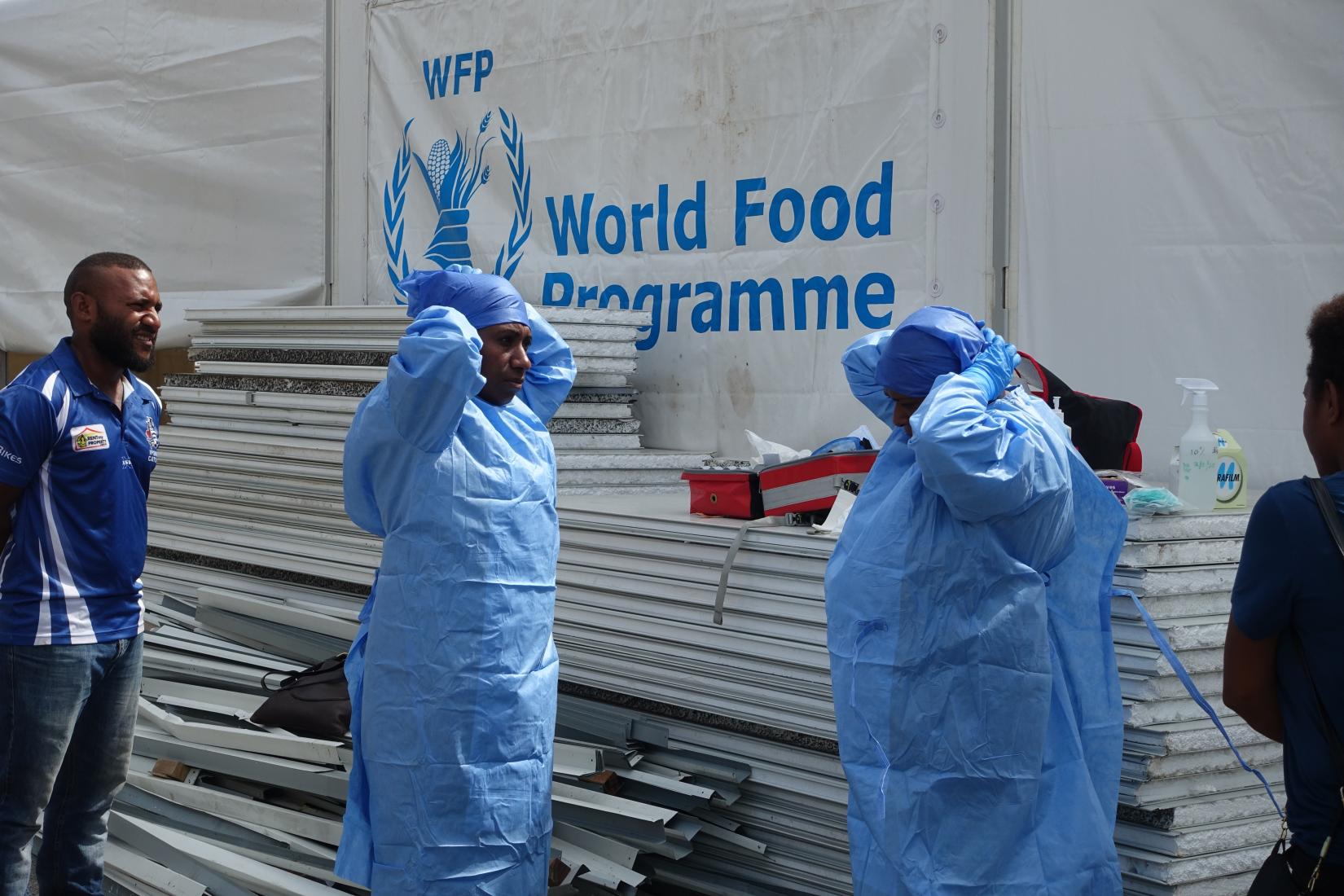
Health Emergency and Humanitarian Coordination
The WHO has established an unparalleled track record supporting the Government contain public health emergencies in Papua New Guinea. Following the 2018 polio outbreak in the country, WHO, in partnership with UNICEF, launched a comprehensive response that included eight rounds of vaccinations covering more than 3 million children that was facilitated by the deployment of experts to all provinces to conduct surveillance, enhance capacity for immunization and increasing uptake of vaccination services. In 2019, WHO prevented a potential measles outbreak experienced by many Pacific countries by integrating measles and rubella vaccines in the ongoing polio response. The proactive strategy protected more than one million children under five years old.
- World Health Organization (WHO) is providing technical, operational and capacity-building support to the National Department of Health under its lead role in coordinating the country’s preparedness for COVID-19 and operationalizing the health-related, communication and logistics pillars of the Pandemic Response Coordination Group created under the National Pandemic Act 2020. WHO also provides strategic and technical advice to the national leadership through the National Control Center and at the local levels through the Provincial Emergency Operations Centers (PEOCs).
- In the transition from the State of Emergency, WHO provided technical support in the drafting of the National Pandemic Act 2020 that provides a legal framework to prepare for, detect and rapidly respond to COVID-19 and other public health threats.
- The UN, as co-chair of the Disaster Management Team (DMT) with Government, is leading the DMT’s implementation of a multi-sectoral plan to support the national response. The DMT brings together NGOs, church leaders and donor partners to share information and coordinate international humanitarian assistance for COVID-19 to Papua New Guinea.
- The UN is providing capacity support embedded with the National Control Centre (NCC)’s Joint Agency Task Force for overall coordination (WHO, UNDP) logistics/procurement (WHO, UNICEF, UNOPS), information management (WHO, IOM), protection (UN Women. UNICEF and UNFPA) and communications/media (WHO, UN RCO). Additionally, it has dedicated focal points from UNDP, UN Women and the UN RCO to track international assistance, liaise with the National Capital District and Bougainville Response Teams.
- WHO supported the establishment of an ‘epidemiological Intelligence Working Group’ for NCC surveillance operation, co-chaired by NDoH and WHO. The group consists of members from NDoH, WHO, CPHL, ADB, Pacific HR and IMR. The main objective of this working group is to establish a coordinated and collaborative approach to collection, analysis and interpretation of COVID-19 surveillance data to inform COVID-19 response and decision making. Daily surveillance updates supported by WHO informs NDoH and Provincial Health Authorities (PHAs).
- At the request of the Autonomous Bougainville Government, the UN is providing support to the Ministerial Taskforce on COVID-19 and to the Department of Health Emergency Response Team. The UN (UN Women) is also providing technical support to the ABG, through the Women Peace and Security working group supporting women’s decision making in the emergency response.
Clinical Management and Health Procurement
- WHO has provided guidance and training to PHAs on case management and infection prevention and control (IPC), supported by NDoH. PHAs have strengthened health facility and workforce readiness, with ongoing efforts being accelerated in response to potential community transmission. As of 30 June, 4,127 healthcare workers have been trained in surveillance, case management, infection prevention and control and risk communication and community engagement.
- In May and June, WHO has delivered 36 GeneXpert cartridges to NDoH. WHO also helped in the procurement of 380 more GeneXpert cartridges, and more than 1,900 kg of (PPE) to the NDoH. The 163 boxes of PPE included face masks, face shields, goggles, gloves and gowns for use by health workers at the District health facilities. In the last few weeks, 46 cartons of masks have already been dispatched to the 22 provinces of the country.
- UNICEF delivered 631,000 PPE items, such as mask, face shields, gloves, gowns, goggles, and coveralls.
- On 20 June, PNG's health system received six ventilators through collaborative efforts of UNICEF and UNDP. These are the first of 30 ventilators scheduled to be delivered. UNICEF has ordered 20 oxygen concentrators, 20 sets of ventilator accessories (patient monitor, pulse oximeter, infusion pump, ECG recorder, Laryngoscope, ABG analyzer and others) for scaling up the critical care service delivery capacity of the PNG health system.
- UNICEF has supported waste management by procuring nice high combustion incinerators for fulfilling the need of highly infectious medical waste disposal capacities in selected provinces.
- UNDP will support health system strengthening by upgrading existing ambulances and procuring additional ones, also to be used in the provinces. This will dramatically increase the capacity of national and provincial health services for first line respondents. PPE for non-health frontline personnel will also be procured.
- United Nations Office for Project Services (UNOPS) is procuring equipment and various laboratory consumables for isolation facilities and installation in 21 provinces, 10 mobile quarantine units and equipping them for the priority provinces identified by the Government. It will refurbish the Port Moresby General Hospital isolation unit and provide 2 Polymerase Chain Reaction (PCR) machines for the Institute for Medical Research COVID-19 testing laboratory in Goroka. UNOPS has also been requested by NDoH to source additional PPE.
- UNICEF, World Food Programme and UNFPA have provided to date, a total of 34 tents for use by the National Capital District and provincial authorities to supplement facilities for triaging, quarantining and isolating patients.
- Through the NDOG-UNICEF PNG COVID-19 Emergency Response Project (with World Bank financing), 3,000 front line health workers and program managers in district and sub-district health facilities across seven highlands provinces will receive essential COVID-19 preparedness and response training in the areas of Infection, Protection, and Control; Case Management and Testing; Surveillance and Contact Tracing and Risk Communication and Community Engagement.
- UNFPA will provide integrated trainings to frontline health workers on COVID-19 prevention and risk mitigation, Sexual Reproductive Health (SRH) and Gender Based Violence in Emergencies/Minimum Initial Service Package (GBViE/MISP).
- UN Women has delivered water andhygiene equipment to Gordons, Boroko, Koki and Gerehu markets in NCD. This includes 23 hand soap dispensers, 1500 alcohol based sanitizers, 100 boxes of masks, 50 litres of hand Hygiene spray and 10 infra-red body thermometers.
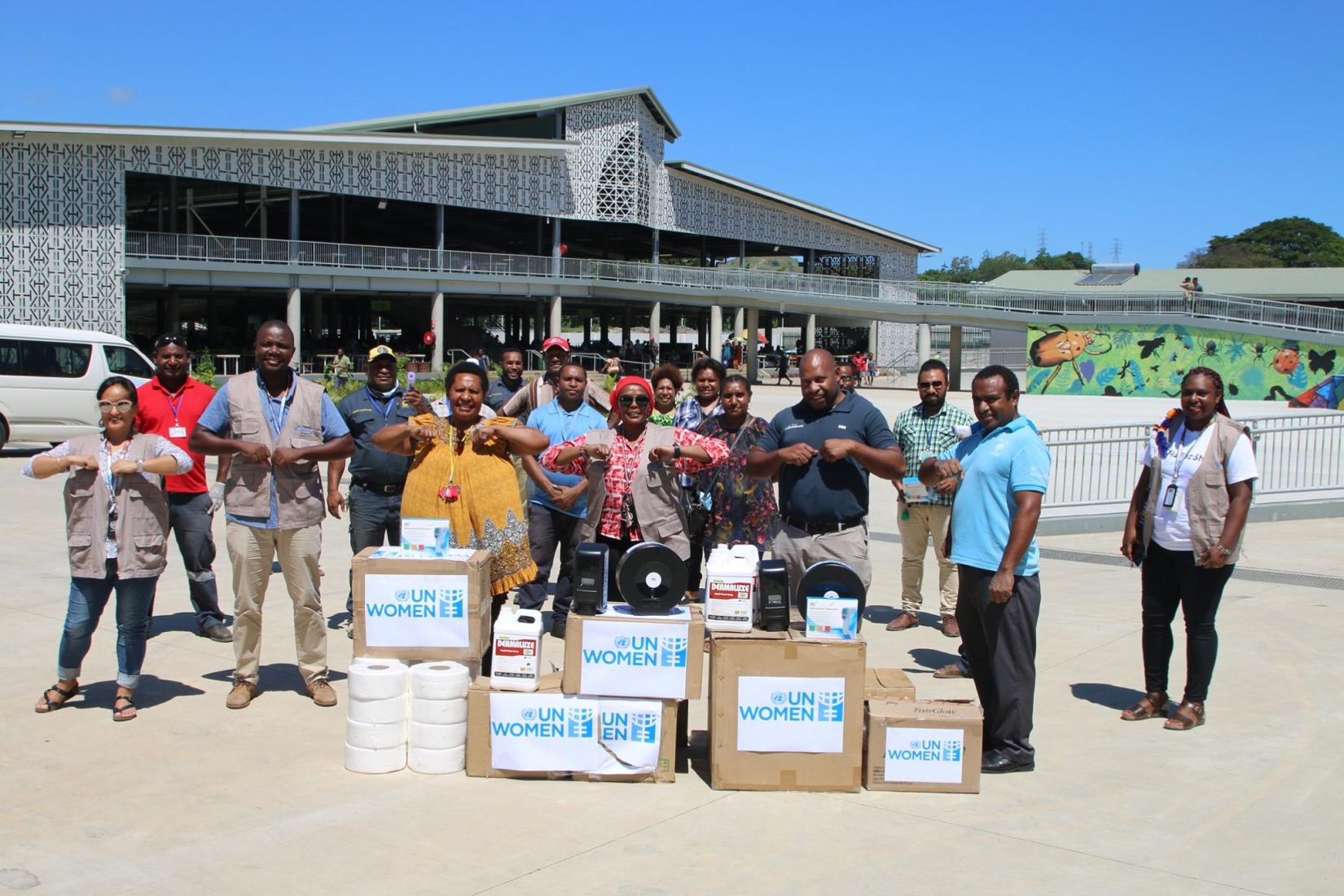
Risk Communication and Community Engagement
The Humanitarian Coordination Group brings together UN, NGO and church partners to coordinate, disseminate and amplify messaging in close coordination with the NEOC and Government partners.
WHO, in support of NDOH developed the country’s COVID-19 risk communications and community engagement plan that includes the message bank for various audiences. The plan is the basis for the communications strategy of the provinces.
- NDOH-WHO teams were deployed to West Sepik, East Sepik and Enga to provide on-the-ground support in the roll out of the Niupela Pasin by conducting information sessions at schools, business establishments and offices on hand hygiene and other preventative measures.
- WHO, together with NDoH, has delivered online training on risk communications and community engagement in Hela, Bougainville and Madang, with on-site training completed in target provinces including NCD, West Sepik, Western and East New Britain.
- WHO has recently assisted NDoH in the development and printing of key messages about traveller’s quarantine (10,000 posters), home quarantine (10,000 posters), safety for frontline healthcare workers; guidelines for mass gathering and messaging across education and all industries. WHO continues to develop messages and info-graphics on a range of COVID-19 issues including; myth-busting, hand washing, general hygiene, domestic violence, vigilance, food and workplace safety, social distancing, stigma and discrimination. 20,000 posters were sent to provinces on donning and doffing of PPE and preparing disinfectant for cleaning.
- IOM is participating in provincial level task force planning on COVID-19 and is supporting Provincial level authorities to deliver messaging to local communities.
- A media campaign, facilitated by UNICEF and NDoH, building awareness and raising the risk perception on COVID-19, is broadcasting key behavior change messages over 800 times per month on 4 major media channels (NBC TV, Wantok Radio Light, Radio Maria and FM100).
- UNICEF has distributed nationwide 100,000 posters on COVID-19 transmission routes, prevention and protection measures and supported school awareness and hygiene promotion campaign that reached 85,000 students in 82 elementary, primary, secondary, national high and technical schools in NCD.
- UNHCR has been engaging with the Government of Papua New Guinea and sharing key messages on COVID-19 with asylum seekers and refugees.
- UNICEF supported community mobilisers in Wakunai District, Bougainville, to provide handwashing demonstrations and instructions on how residents can make tippy taps.
- UN Women conducted awareness raising at Koki and Sabama markets in Port Moresby. The main topics covered were how COVID – 19 is spread, symptoms of COVID – 19, and how to prevent and reduce infection of COVID – 19. Three hundred and ninety nine people (136 male, 263 female) were trained including market vendor association reps and market management staff. 200 COVID -- 19 posters were also distributed which included key infection control and hygiene etiquette messaging. The posters target populations with lower literacy levels in three different national languages.
- UN Women has conducted market assessment in 3 districts, Kimbe, Alotau and Wewak. Knowledge levels about COVID – 19 were very low whereby 20% were not aware of the symptoms and how COVID 19 is prevented. The assessment noted that market vendors believed in traditional and unproven methods of treating COVID – 19 such as lemon, ginger, garlic and hot weather. UN Women has utilized these survey findings to inform how we create and distribute IEC materials for COVID19 prevention.
- UNRCO has assisted in creating interactive voice response for the national COVID-19 hotline, enabling call centre staff to respond more efficiently.
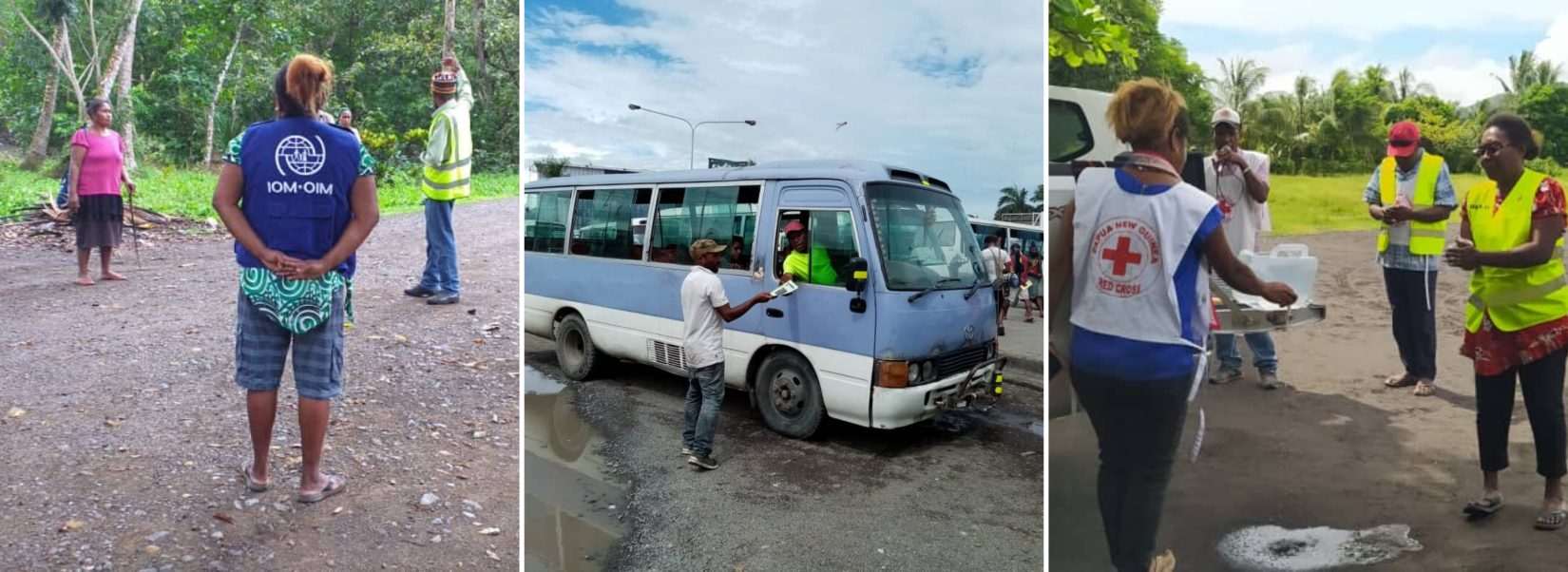
Protection and Secondary Impacts
Recognizing that this is broader than just a health emergency and that many aspects of peoples’ lives are impacted by COVID-19, the UN is also monitoring and preparing to respond to secondary impacts.
UN Women, UNDP, UNAIDS, OHCHR and UNFPA have been engaging with National Capital District and national and provincial partners on protection concerns for high-risk populations, including people living with TB or HIV, people living with disabilities, displaced persons and on matters such as sexual and gender-based violence (GBV).
Secondary Health Impacts
- WHO continues to monitor disease trends in people in Papua New Guinea and support essential health services, particularly maternal and child health, HIV/AIDS, tuberculosis and vaccine-preventable diseases and the implementation of routine immunization.
- UNFPA has distributed RH Clean Delivery Kits and supplies to support border communities in Western Province to conduct safe deliveries of babies. Additionally, the agency has distributed dignity kits to 46 women at the Refugee Transit Camp in Kiunga.
Gender-Based Violence
- UNFPA has provided Dignity Kits and PPEs to GBV survivors via Family Support Centres. Moreover, to ensure key essential health services on SRH and GBV (Family Support Centre) have been supported so that these are operational during the duration of the COVID-19 pandemic.
- UNDP is ensuring gender-based violence services continue by supporting safe houses to remain open and critical policing functions to continue under the Royal Papua New Guinea Constabulary. These efforts also include supporting members of Parliament to advocate against gender-based violence nationally and in their electorates.
- UNDP has also provided grants to local NGOs to enable them to continue to run safe-houses and other essential services for victims of gender-based violence, and family and sexual violence.
- UN Women has provided financial support to the ChildFund 1-Tok Kaunsellin Line to enable them to expand their service rapidly in response to COVID19 and subsequent increase call rates in GBV and Child Protection calls. The service has added 6 new counsellors to their team. Call rates to the hotline increased from 606 calls in March to 1826 in May The helpline is a crucial access point for survivors as it provides a free nationwide crisis support service.
- UN Women, in collaboration with Spotlight Initiative, is providing 13 safe houses and Family Support Centres around the country with K100 000 worth of vouchers. The vouchers cover Food and Hygiene equipment items. UN Women also provided these services with PPE, including 1300 N95 face masks, 39 infra-red thermometers, 156 5 litre alcohol based sanitiser, 600 packs of paracetamol, amoxicillin and vitamins. 390 bars of medicated soap, 1300 gloves. UN Women is also providing transport vouchers for front line GBV services so clients can access services.
- UN Women, under the Women Make the Change Project Team, delivered workshops for 21 women candidates with a session on COVID- 19 in Arawa Bougainville from the 23rd to the 24th June 2020. The COVID-19 information session included prevention, infection control & safety measures to follow during election activities and campaigning.
- In the Autonomous Region of Bougainville, the RCO and UN Women are supporting the Women, Peace and Security Technical Working Group on gender-specific policy implications. With UN Women, the Liaison Officer made a presentation on Gender-Sensitive Responses to COVID-19: Opportunities for Parliament in a time of crisis, urging Members of the House of Representatives to take action to ensure that emergency legislation, relief packages and budgets respond to known gender policy implications, rectifying any sources of known gender discrimination.
Child Protection
- To expand Mental Health and Psychological Support Services (MHPSS) to more children and adolescents in PNG, UNICEF trained 10 counsellors of the ChildFund Helpline on the use of U-partners, a platform that allows online counselling and referral, while ensuring privacy and confidentiality. In addition, 27 children and adolescents aged 2-17 years (14 girls and 13 boys) who experienced and reported violence or neglect to the Helpline were referred to the Family Support Centres and the police for essential services.
- UNICEF is providing ongoing financial and logistics support to map available services across all provinces for children in need of care and protection and the impact of COVID-19 on the delivery of these services as well as conduct rapid needs assessment of the social welfare workforce in the country and the impact of COVID-19 on their work and or capacity to operate. In addition, UNICEF is finalising agreements to implement WASH facilities and a hygiene campaign in 39 high density schools in NCD.
- With EU support, UNICEF will complement ongoing water and sanitation work in 300 vulnerable communities in four districts of Goroka, Mt Hagen Central, Nawaeb and Central Bougainville by providing clean water to 2,045 households and hygiene kits to 1,410 households to help prevent disease spread.
People Living with HIV (PLHIV)
- UNAIDs has established a COVID-19 Response Centre for people living with HIV (PLHIV) and other key populations and has created a Facebook page to act as a hub for sharing information virtually and is surveying people living with HIV, mapping key clinics, monitoring antiretroviral drug supplies, and is exploring establishing a national hotline for PLHIV on HIV treatment. It is also working with NDoH and other partners on a HIV treatment supply chain focusing on key treatment hubs throughout the country ensuring an immediate re-supply of stock in the coming week. This is crucial for ensuring treatment continuity and reducing the strain on health facilities.
Food Security
- FAO is monitoring food security impacts from both COVID-19 and African Swine Fever in the Highlands and Fall Armyworm in Western and West Sepik (Sandaun) provinces.
Displacement
- IOM is monitoring displacement related to COVID-19 and response measures in the 16 provinces where IOM is active.
Stigma
- RCO, UNICEF, WHO and UNAIDS partnered with the State of Emergency Controller to deliver a dialogue with media editors on responsible reporting for COVID-19.
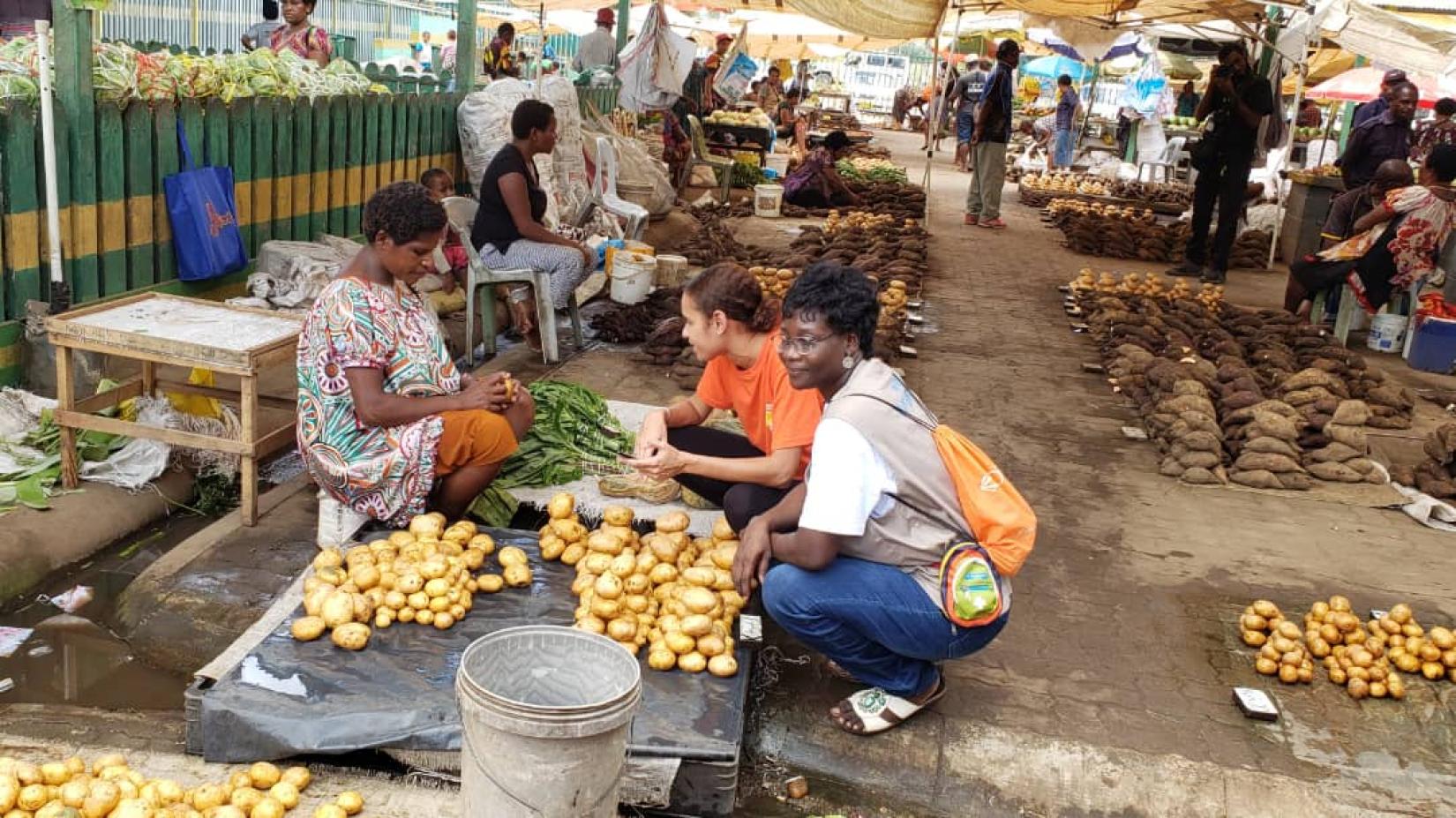
Socio-Economic Impact and Recovery
UNDP in collaboration with RCO is leading the overall UN Socio-economic Impact Assessment for Papua New Guinea of the COVID-19 crisis in partnership with the entire UN Country Team,, including UNICEF, UNFPA, UNCDF, UN Women, IOM, FAO, and UNAIDS. Government, development partners and International Financial Institutions are also providing inputs. The impact assessment is based on surveys conducted by UNDP which have reached over 6,000 households and more than 3,000 Micro, Small, and Medium-sized Enterprises (MSMEs), providing in-depth disaggregated data on the impacts on all districts and provinces of Papua New Guinea.
The assessment will evaluate the impact on key economic and social sectors and propose as well costed measures, policies, and programmes to ensure increased social protection, resilience and economic recovery with a view to preserve development gains made over the past three decades. Addressing structural challenges that have been further exacerbated and exposed by the COVID-19 global crisis will also be highlighted with the aim to support government and private sector to build back better, greener, and more sustainably.
The Socio-Economic Impact Assessment will offer various policy options that can be considered by Government, policy makers, private sector, development partners, and the UN itself. It will also be the basis for the UN Country Team to develop an immediate, medium and long-term recovery plan for the country outlining programmes that already contribute to recovery, programmes that need to be further adjusted to enable them to make maximum impact, as well as new programmes that need to be added to the UN Sustainable Development Coordination Framework in order to address identified programmatic recovery gaps.
The impact assessment will be published in August 2020.
Useful Links
World Health Organisation (official website)
Information Centre for COVID-19 in PNG (official website)
PNG National Department of Health (official website COVID-19 updates)
UNDP Situational Update (UNDP Papua New Guinea)
COVID-19 posters and materials (compiled by UN RCO)

